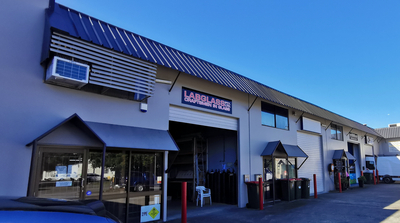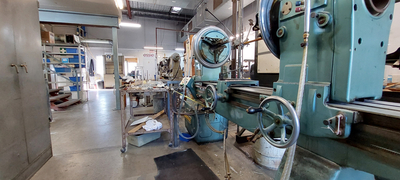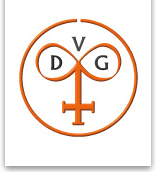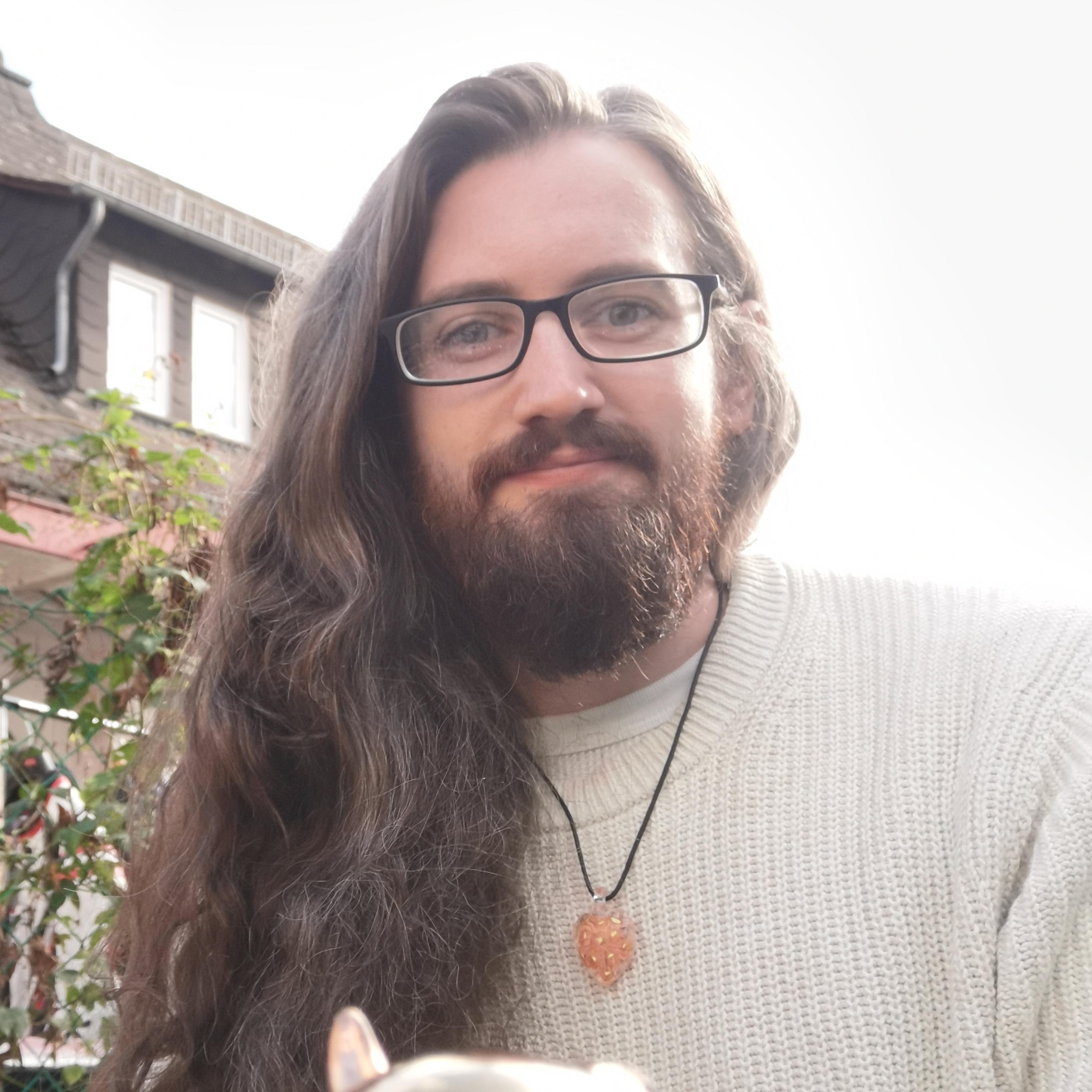
Michael Leeder
An Australian took an apprenticeship at Weilburg-Hadamar Glass School
An exotic story to be proud of. The Weilburg-Hadamar Glass School received an email from Australia in 2019. It was an application from a young man asking for an apprenticeship as a glass apparatus builder. His wish came true. Michael Leeder now lives in Brisbane again and on the following pages tells us how and why he came to Germany, what he is doing today and how he imagines his future.
VDGN 3/2021
Everything the other way around
The story of this report is upside down. Geographically, Australia is, as they say, down under, and similarly, this report actually begins with its end, because the beginning of this story only came to the editors of the VDG-N in the second step of the writing and editing process. It's almost become a habit: Every now and then, when the curiosity gets overwhelming, the editors get in touch with the glass schools and find out about the latest news. Such conversations, which often start with an e-mail, can make an editor very curious. An Australian did his training in Hadamar and has now returned home. Questions upon questions whirled through my head. We ourselves, more than 20 years ago, as a young family, travelled Down Under for several months, visiting glass blowing workshops and asking with interest what the job opportunities were like. I could definitely have imagined taking a job there. I was still young then, I hadn't understood a lot and at the same time I had the responsibility of a young father. What does the world of a scientific glassblower in Australia look like today? I would like to find out more about this young glassblowing colleague.
„Michael Leeder goes back to Down Under as a scientific glassblower
Our student with – probably – the longest journey returns to Australia victoriously. Michael Leeder began his apprenticeship to be a scientific glassblower in September 2019 at the Staatliche Fachschule Weilburg-Hadamar (Weilburg-Hadamar Glass School). He started with very little German and no state financial support, but with plenty of perseverance and talent. On February 4th, Michael successfully took his final exam to become a scientific glassblower. Scientific glassblowers use glass tubes, rods and flasks to create a variety of apparatus that are used in scientific laboratories, test centres and medical applications. With his graduation certificate in his pocket, Michael Leeder could start his journey home to Australia. We are proud of such an exceptional success story.”
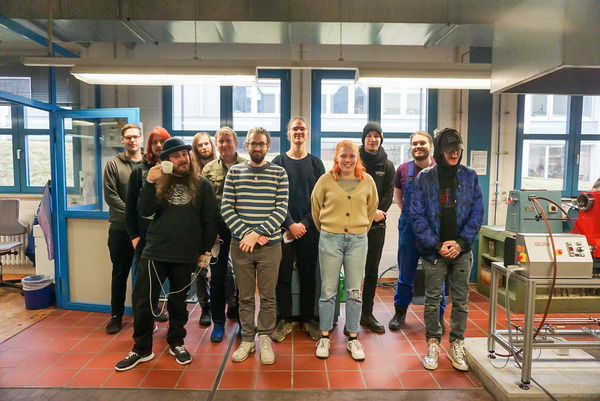

Making contact with Michael
After these words it was inevitable for me! My questions needed answers. We were able to get in touch with Michael through the school and so I wrote to him asking to learn more about him. Less than two days later, I received a kind reply saying he was willing to work with us.
A report by Michael Leeder
As a child, my mother often told me that I would make a good paramedic or glass blower. I don't really know why, because as a child I had little idea what a glassblower actually does every day, I imagined that they make large vases and lamps and that was it. This idea did not particularly appeal to me. It wasn't until I was much older that I realized there were other types of glassblowing. As for the paramedic, while looking at wounds doesn’t make me feel queasy, I’m not sure this would have been the right path for me. I also think that the work would have been too emotionally taxing for me in the long run. But many years later, in 2015, I started to take a closer look at the glassblowing profession. I got curious and scoured the internet. When I was looking for equipment online, I found a website called 'Devardi Glass' that sells cheap beginner kits, and that’s how my exploration into the glass blowing world began, because that's where I bought my first set of tools and a torch. Since there were no teachers around, I had to teach myself everything, and I did that by watching tutorial videos on YouTube. Of course, back then I bought a small burner from Devardi.com that only needed propane to work, but I quickly outgrew it and bought a small burner from Glasstorchtech.com. A completely different torch because this burner required oxygen and propane. Of course, I also had to solve the oxygen problem, as bottled oxygen is quite expensive, so I bought an oxygen generator that can produce 10 litres of oxygen per minute. I now have a small set-up in my garage that contains everything required for lampworking: table, glass, oven, burner, gas and oxygen.
The path to Germany
But now back to the question of why and how I came to Germany. In Australia there are very few opportunities to learn the trade of scientific glassblowing. One option would be to be born into a glassblowing family and learn from your parents. Another option is to wait many years for a job to be advertised, but I've only heard of that once so far. And that is it, as far as I know. A more far-reaching possibility, and the only one that made sense for me, was to leave Australia and start an apprenticeship abroad, because there are no technical schools or universities specializing in glass in Australia that offer apprenticeships. On my constant search, I found a group of scientific glassblowers and took part in one of their annual conferences. It was the Australian Scientific Glassblowing Association, which unfortunately no longer exists. Shortly after I attended their annual meeting, the association decided to disband due to dwindling numbers of glassblowers, as most members were ready to retire. Unfortunately, you cannot advance a professional association with just one young member. This state of affairs is very unfortunate, because a lot of knowledge will be lost as a result in the coming years.
When I asked if there was someone who could train me, the only answer I got was that they had neither the time nor the money to train me, although they would very much like to. They thought the best way to learn this trade was to go to Europe.
As luck would have it, I met a young glassblower from Germany, Peter Rotner, at this very event. Wherever possible, he wanted to earn a bit of money as a skilled worker in my home country to help finance his adventures. What better way to make contacts than at a glassblowing conference. Peter told me about the Glasfachschule Zwiesel and suggested that I apply as an apprentice there. I did and 6 weeks later I found out that they didn't have room for a new student. So I looked for other schools in Germany and found one called Glasfachschule Hadamar. I sent an e-mail introducing myself and shortly thereafter received a letter back saying they would accept my application. Four weeks later I was in Germany.
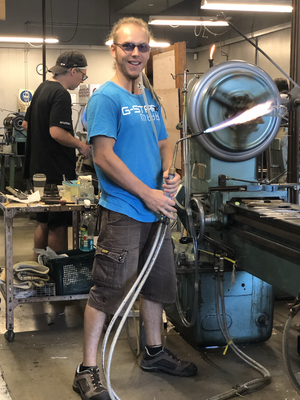
To Germany at the speed of light
My journey from Australia to Germany was very stressful, I had less than 4 weeks to get a German student visa, move out of my apartment and find accommodation in Germany. The paperwork was a nightmare, but somehow we made it through. In addition, I was already married at the time and unfortunately I couldn't take my wife with me to Germany. We were going to visit each other every 6 months but shortly after I arrived, Covid happened and we couldn't see each other anymore. We were separated for 2 ½ years.
My first day in Hadamar
My first day in Hadamar was overwhelming in a good way, I arrived at the school and luckily the first person I met was my teacher and mentor Mario Pohlman, although we couldn't communicate easily, he knew who I was and drove me to my apartment, where we also met my new landlord. The theory classes were a big surprise for me. I wasn't aware that there would be classes in maths, sciences, ethics, politics, etc. I couldn't understand anything and that's why I failed the first few months in class. It took me about 1 year to understand enough to pass the tests. Most of my classmates spoke quite good English which made communication easier, and when I really needed a translation my friends were always willing to help. I was able to shine in practical classes. I loved every moment. After all, that's why I came to Germany. Whenever I could, I stayed as long as possible, practicing on difficult implements and making flower pendants to sell.
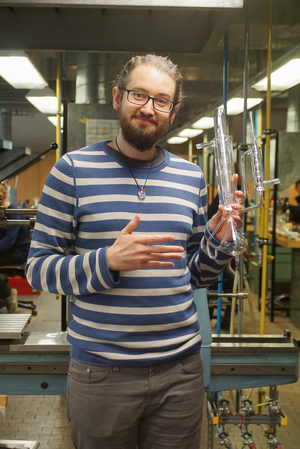
My German definitely had to get better!
I had no money for language classes, and the free classes the state offered were only for refugees. So I used phone apps to improve my language skills and wrote lists of words to memorize. German audio books also helped a lot. When I left Germany I could understand almost everything that was being said around me, however I found speaking very difficult as I am naturally a quiet person.
Financing my stay in Germany
I came to Germany with enough money for 2 years of rent and food. And to fund the 3rd year I had planned to sell the glass art I would be making on the side. My teacher Mario Pohlman was a lifesaver in this respect. He found me odd jobs here and there and organized paid work during the summer holidays.
